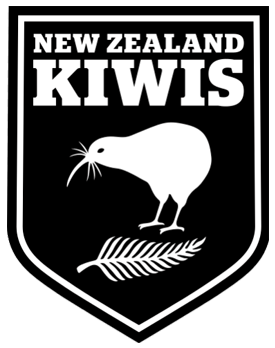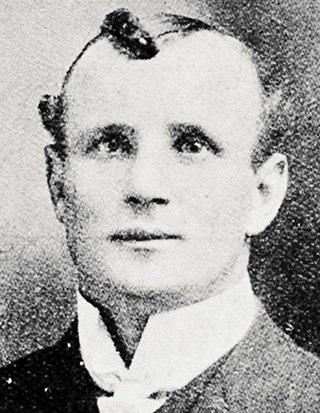Related Research Articles
Shane Paul Howarth is a former international rugby union player who gained four caps and scored 54 points for the All Blacks before later switching allegiance to Wales, attaining 19 Welsh caps.

The New Zealand national rugby league team has represented New Zealand in rugby league since 1907. Administered by the New Zealand Rugby League, they are commonly known as the Kiwis, after the native bird of that name. The team's colours are black and white, with the dominant colour being black, and the players perform a haka before every match they play as a challenge to their opponents. The New Zealand Kiwis are currently second in the IRL World Rankings. Since the 1980s, most New Zealand representatives have been based overseas, in the professional National Rugby League and Super League competitions. Before that, players were selected entirely from clubs in domestic New Zealand leagues.

The England national rugby league team represents England in international rugby league.

The Wales rugby league team represents Wales in representative rugby league football matches. Currently the team is ranked 17th in the IRL World Rankings. The team was run under the auspices of the Rugby Football League, but an independent body, Wales Rugby League, now runs the team from Cardiff. Six Welsh players have been entered into the Rugby League Hall Of Fame.

Colin Charvis is a former captain of the Wales national rugby union team and also played for the British & Irish Lions. A back row forward, Charvis was equally adept as a flanker or as the no. 8.

Gary Ross Freeman is a New Zealand former professional rugby league footballer who played in the 1980s and 1990s, and coached in the 2000s, who both captained and coached the New Zealand national team. He was arguably one of New Zealand's greatest Test halfbacks and at the time of his retirement he was the most-capped New Zealand test player and also held the record for most consecutive tests for New Zealand with 37.
Nathan Fien, also known by the nickname of "Fieny", is an Australian professional rugby league assistant coach with the Dolphins for their inaugural 2023 season in the National Rugby League (NRL) competition.
Brett David Sinkinson is a New Zealand born rugby union player who played for the Wales national rugby union team. A flanker, he was known for his mobility and hard tackling. He never played for New Zealand.
Jason Jones-Hughes is an Australian born rugby union player who played for the Wales national rugby union team. The fact that he represented Wales caused friction between the two national rugby unions as he had played for the Australian Barbarians and was part of the Australian team that toured Argentina in 1997 before representing Wales. The International Rugby Board ruled he was eligible to play for Wales as he had not played a full international match for Australia national rugby union team and he had a Welsh qualification through his parents. In 2000 he was initially implicated in the "grannygate" scandal before being exonerated.
Robert Piva is a former New Zealand international rugby league footballer who played in the 1980s and 1990s. A prop forward, Piva played for Wakefield Trinity and was a foundation player for the North Queensland Cowboys.
Dave Hilton is an English-born former Scotland international rugby union player. He was capped 42 times for the Scotland national rugby union team. In his club career he played for Bath Rugby, Glasgow Warriors and Bristol. His position of choice is as a prop.
John Rutherford "Jock" Butterfield was a New Zealand rugby league footballer who played in the 1950s and 1960s. He was named amongst the finest that New Zealand produced during the 20th century. A New Zealand international representative forward, he played his club football in various places in New Zealand, New South Wales and Queensland. Butterfield held the record for most test caps for the New Zealand national team until overtaken by Gary Freeman. In 2007 he was named at hooker in New Zealand's rugby league team of the century.
The 1913 New Zealand rugby league season was the sixth season of rugby league that had been played in New Zealand.

Charles Savory was a New Zealand international rugby league footballer and champion boxer who died in the First World War. An Australasian and New Zealand international representative forward, Savory was one of four Kiwis players selected to go on the 1911–12 Kangaroo tour of Great Britain. Due to playing the same sports, he has been described as "the Sonny Bill Williams of his time."
Maitua Feterika is a New Zealand rugby league footballer.
Regulations relating to the eligibility of players to play for national teams in rugby union, both in the fifteen-a-side game and rugby sevens, are the responsibility of World Rugby, the governing body for the sport. Players' eligibility to represent a country depends on whether they have a genuine, close, credible and established national link with that country.
As the governing body of rugby league, the International Rugby League (IRL) is responsible for maintaining and implementing rules that determine whether a rugby league player is eligible to represent a particular country in officially recognised international matches and tournaments.
References
- ↑ Hilton ineligible
- ↑ "Stuff.co.nz". Archived from the original on 2007-09-30. Retrieved 2006-11-03.
- ↑ "League: Fien in frame for Kiwis comeback". New Zealand Herald. 2 October 2008. Retrieved 28 June 2022.
- ↑ Barclay, Chris (7 September 2013). "Nathan Fien bows out of NRL with no regrets". stuff. Retrieved 28 June 2022.
- ↑ Foxsports.com
- ↑ Smh.com.au